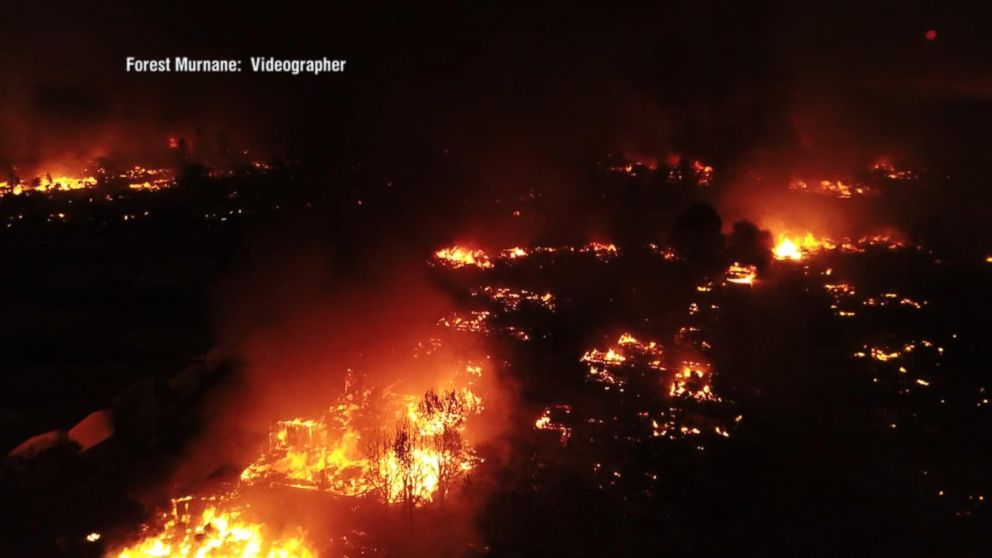
Transcript for ‘Everything we’ve worked for.. gone’: Santa Rosa remembers fire one year later:Part 1
This has been one of the most difficult years we’ve ever had. That confirmation comes in, gut punch. One year later I could put everything I own in a laundry basket. We’ve got to get out of here. I don’t know where to go. . Come on, let’s go, let’s go, come on! That night seemed like a complete blur. I remember just saying, you need to evacuate, and evacuate now. Reporter: Memory can be a funny thing. Sometimes it’s crystal clear. Go, go, go, go! Reporter: Other times it’s just flashes, sights and sounds. Just sirens. I just remember hearing sirens, it seemed like for days. Reporter: We don’t always get to choose what we remember and what we forget. For firefighter Paul Lowenthal and some residents of Santa Rosa, California — Oh my god, it’s just all gone. Everything we’ve worked for, it’s all gone. Reporter: Memory is all that remains from that night in October 2017. When a raging wildfire passed over the rolling hills of wine country and overtook the quiet suburb of Santa Rosa. We have multiple structures involved. I just knew the house was going to be gone within 15 minutes. Oh my god. You have to go southbound, get out of here, go. I have a 9-year-old! Definitely not something I think I’d ever experience in the city of Santa Rosa. Reporter: For some it came with no warning and dealt a vicious hand. Charcoal the size of heads, cinders just falling. Reporter: In its wake, utter devastation. Whole neighborhoods reduced to ash. Now, one year later, Santa Rosa’s residents are still grappling with how they suffered through until this week, the most destructive wildfire in California history. Looking at what went ws they rebuild from the ground up to try to ensure the disaster of this magnitude will never strike home again. Nobody’s prepared. Not for what happened the way it happened. Nobody’s prepared. Reporter: October 8th, 2017. Started off as a warm, dry, and breezy Sunday. What are known as the diablo winds are picking up steam as they move through the city. Veteran firefighter Paul Lowenthal notices the winds, but his mind is diverted instead to the monotonous rhythms of fatherhood. My daughter and I were in Hawaii for the week. Kind of setting in, trying to get back into a Normal routine. Getting ready to start a school and a workweek. Reporter: But that night, around 11:00 P.M., he gets a call from work. Started seeing glows in the distance. Eventually hit a wall of fire. Literally fire on both sides of the road, blowing across. There was no way to get through it. That’s when I knew this was not coming to Santa Rosa, this was here. What’s going through the pit of your stomach? We’ve got to get people out, we’ve got to get them out now. Reporter: It’s the middle of the night and most of the city is asleep. Paul calls the Santa Rosa police department for help. They’re going to start moving us into the creek and farm area — Those police officers just dove in without asking questions, and immediately started going door to door and getting people out of harm’s way. Police! Reporter: With body cameras rolling, police officers are deployed to areas where they think the fire is going. But the wind has a mind of its own. The wind pushes the fire farther than first responders had anticipated, leaving some residents in the neighborhood of Coffey park unaware of what’s headed their way. I can actually feel the heat. It was the loudest wind I’ve ever heard in my life. It was — it was like a — just a barreling sound of nonstop wind. It was like a blow torch. The lights started to flicker. Okay, let’s just get water and candles together, put them on the table. I went to the front door and see it’s really windy and smoky and ash was flying. Then within less than five seconds, I looked back, and it was a wall of red. What’s going through your mind? We’ve got to go. One of our neighborhoods walked to a viewpoint up the 101. She came running around the corner and said, it’s hopped the 101, get out, get out. It hopped the 101 means it hopped a six-lane freeway? Yeah. Now it’s on your side? Yeah. We didn’t say anything to your neighbors, like go get your neighbors, or talk to you soon. We just ran back into our houses, grab the dogs, grab some clothes, we grabbed some of our son’s stuff, put it in a duffel bag. Get in my car, turn the corner, and there’s somebody’s lawn on fire. I see flames coming up over the rooftops. That’s when it registered with me, this is bad, this is real bad. There was ash and embers coming down as we’re getting in the car. Literally fire raining down. You’re fleeing for your lives? Yeah. I had a hose, I couldn’t have saved my house. Just the ferociousness of the winds and the embers from that field and everything else, blowing across. Reporter: In another area of Coffey park, officers reach the home of Nancy and Ken mizoni. Hello! What’s your plan? Just in here with a hose. Yeah, you’re going to fight it out? I’m going to fight it out. You sure? Yes. Anybody else here with you? Me and my wife. Do you want me to get your wife out of here? No, she’s all right. It’s chaos, where are we going to go? We can get her where she needs to go. Reporter: This is Ken’s wife Nancy. Her husband’s having a hard time talking about that night, and she struggles to do so too. Ken seemed pretty adamant that he was going to stay. We were staying. We were staying. Fire department had to be — they had to be coming. They’ve got this. It’s just a matter of, we’re going to help them out, you know. Reporter: What Nancy and her husband didn’t know at the time was that the fire was already destroying the area around them. It just hadn’t reached their home yet. Sir, you’re going to put a lot of people in danger. The fire is a couple of houses over, it’s coming at us. It’s huge. Please. We need to get you out of here. Please get in the car and leave. You have two officers here now — Where should I go? That way. That way. Just get out of here. It is one field away. Like right now. I’m leaving now because I’ve got to save myself and save other people. You could hear the urgency in the police officers’ voice. Ken didn’t want to hear it? Didn’t want to believe it, couldn’t grasp it. We were in shock. Reporter: Not long after the officers leave, terror sets in. I remember jumping down and I had the hose. And Ken said, quick, we got to go, we got to go, we’re going to come right back. And when I ran — when I got to the front of the house where the fire — it was 30-foot flames across the street from us. All you saw was fire. Reporter: With only seconds to spare, Nancy and Ken joined the multitude of others fleeing for their lives. Fire! Reporter: But some are finding themselves stranded, like Mario Montes. A police officer knocked on the door and I told him, well, I can’t evacuate, I have five ladies with me in the house, I need help. Reporter: He is the sole caretaker on duty at the assisted living center. He immediately begins helping police officers with the evacuation. I had — I ran with me taking Irene out. Reporter: Mario passes 87-year-old Irene Lopes to officered on damns who wheels her out of the house and struggles to load her in the back of his car. I cannot walk! Okay, I’ll help you. Reporter: Embers are raining down upon them. The fire is right there. I can’t, my feet — I was putting her in a lot of pain, helping her get into the car. Please help me! Ai-yi-yi, my legs! I’m sorry, you’ve got to sit up. Okay. Reporter: Once the cars are loaded up, the officers make their escape. Let’s get out of here. I got it, I got it. Let her in. Reporter: And safely drive the women to an evacuation center. 2 inches from the ground. Reporter: Where they’re welcomed by first responders, volunteers, and a group of mass evacuees, so many afraid of what
This transcript has been automatically generated and may not be 100% accurate.





